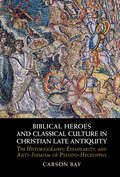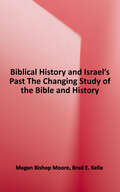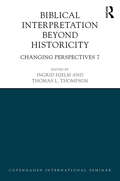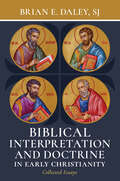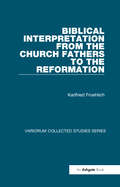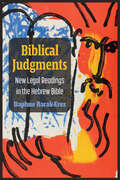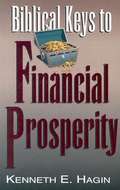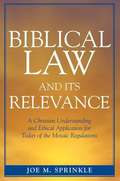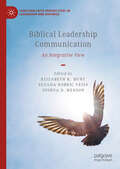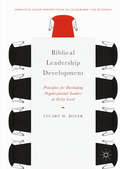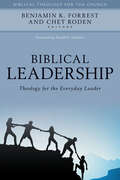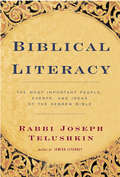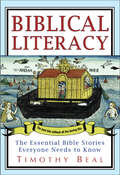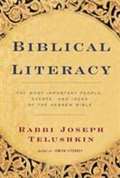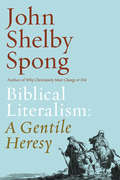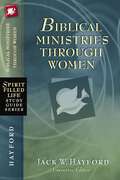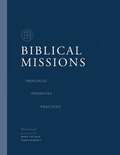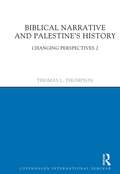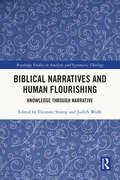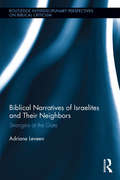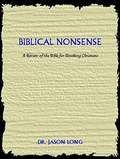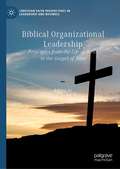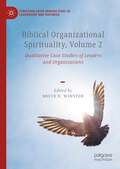- Table View
- List View
Biblical Heroes and Classical Culture in Christian Late Antiquity: The Historiography, Exemplarity, and Anti-Judaism of Pseudo-Hegesippus
by Carson BayIn this volume, Carson Bay focuses on an important but neglected work of Late Antiquity: Pseudo-Hegesippus' On the Destruction of Jerusalem (De Excidio Hierosolymitano), a Latin history of later Second Temple Judaism written during the fourth century CE. Bay explores the presence of so many Old Testament figures in a work that recounts the Roman-Jewish War (66–73 CE) and the destruction of Jerusalem in 70 CE. By applying the lens of Roman exemplarity to Pseudo-Hegesippus, he elucidates new facets of Biblical reception, history-writing, and anti-Judaism in a text from the formative first century of Christian Empire. The author also offers new insights into the Christian historiographical imagination and how Biblical heroes and Classical culture helped Christians to write anti-Jewish history. Revealing novel aspects of the influence of the Classical literary tradition on early Christian texts, this book also newly questions the age-old distinction between the Christian and the Classical (or 'pagan') in the ancient Mediterranean world.
Biblical History and Israel's Past: The Changing Study of the Bible and History
by Brad E. Kelle Megan Bishop MooreAlthough scholars have for centuries primarily been interested in using the study of ancient Israel to explain, illuminate, and clarify the biblical story, Megan Bishop Moore and Brad E. Kelle describe how scholars today seek more and more to tell the story of the past on its terms, drawing from both biblical and extrabiblical sources to illuminate ancient Israel and its neighbors without privileging the biblical perspective. Biblical History and Israel’s Past provides a comprehensive survey of how study of the Old Testament and the history of Israel has changed since the middle of the twentieth century. Moore and Kelle discuss significant trends in scholarship, trace the development of ideas since the 1970s, and summarize major scholars, viewpoints, issues, and developments.
Biblical Interpretation
by John BartonModern western critical study of the Bible has radically altered the fabric of Christian belief. This book explains what interpretation is and what special issues arise in biblical interpretation. The authors analyze the development of traditional literary and historical criticism and more recent social, scientific, and literary approaches, focusing on the key figures from Reimarus to Gerd Theissen, and exposing the underlying theological issues. What emerges is a pattern in the relationship between religious interests in the texts and the rational methods used to interpret them, providing guidance for a theologically sensitive use of the Bible today. The book includes an annotated index with detailed information on over 250 biblical scholars and other interpreters.
Biblical Interpretation Beyond Historicity: Changing Perspectives 7
by Thomas L. Thompson Ingrid HjelmBiblical Interpretation beyond Historicity evaluates the new perspectives that have emerged since the crisis over historicity in the 1970s and 80s in the field of biblical scholarship. Several new studies in the field, as well as the ‘deconstructive’ side of literary criticism that emerged from writers such as Derrida and Wittgenstein, among others, lead biblical scholars today to view the texts of the Bible more as literary narratives than as sources for a history of Israel. Increased interest in archaeological and anthropological studies in writing the history of Palestine and the ancient Near East leads to the need for an evidence-based history of Palestine. This volume analyses the consequences of the question: "If the Bible is not history, what is it then?" The editors, Hjelm and Thompson are members of the Copenhagen School, which was formed in the light of this question and the commitment to a new approach to both the history of Palestine and the Bible’s place in ancient history. This volume features essays from a range of highly regarded scholars, and is divided into three sections: "Beyond Historicity", which explores alternative historical roles for the Bible, "Greek Connections", which discusses the Bible’s context in the Hellenistic world and "Reception", which explores extra-biblical functions of biblical studies. Offering a unique gathering of scholars and challenging new theories, Biblical Interpretation beyond Historicity is invaluable to students in the field of Biblical and East Mediterranean Studies, and is a crucial resource for anyone working on both the archaeology and history of Palestine and the ancient Near East, and the religious development of Europe and the Near East.
Biblical Interpretation and Doctrine in Early Christianity: Collected Essays
by Brian E. Daley SJEssays on patristic biblical interpretation and doctrine, written by a renowned historical theologian Brian E. Daley, SJ, is a highly acclaimed scholar of early Christian theology. In a prolific career spanning more than forty years, he has published his research in a wide range of academic journals and edited collections; this book represents the first time that several of his studies of patristic biblical interpretation and doctrine have been brought together in one volume. The eighteen essays in this collection examine topics including patristic exegesis, Origen&’s De principiis, Cappadocian scriptural interpretation and doctrine, early Christian views on redemption and eschatology, and modern retrievals of patristic scriptural interpretation. This informative and insightful volume is an essential resource for theologians, exegetes interested in the history of interpretation, and theological libraries.
Biblical Interpretation from the Church Fathers to the Reformation (Variorum Collected Studies)
by Karlfried FroehlichThe history of biblical interpretation has attracted considerable attention in recent decades. This is particularly true in the field of medieval exegesis where much effort has been spent on making primary materials available and advancing their interpretation. One area of research in which even the most basic questions are still under debate is the phenomenon of the biblical Glossa Ordinaria, the standard Bible commentary used by Christian theologians from the twelfth century to the Reformation. Part I of the present collection unites the author's major contributions to Glossa studies - its origin, its false ascription to Walahfrid Strabo, its use among the preachers of the thirteenth and fourteenth century and the Reformers, both Catholic and Protestant, of the sixteenth. A central concern here is the fascinating history of the printed Gloss which began with the Strasbourg edition of 1480/81. Part II concentrates on the image of two central New Testament figures, the Apostles Peter and Paul, in biblical exegesis. The studies illuminate the pivotal role in the history of the church played by certain shifts in the understanding of Petrine texts, and trace conflicting tendencies in the interpretation of Paul down to the Reformation of the sixteenth century. Three of the thirteen essays have not been published before.
Biblical Judgments: New Legal Readings in the Hebrew Bible (Law, Meaning, And Violence)
by Daphne Barak-ErezBiblical Judgments invites readers to consider today's timeless dilemmas of law and government, social justice, and human rights, through the perspective of a text that has helped shape western society: the Hebrew Bible. By focusing on biblical narratives and literature rather than on traditional interpretations of biblical law, Daphne Barak-Erez is able to look beyond historic norms to concentrate on what Old Testament stories can reveal about the "big" issues. She discusses questions such as: What can modern-day governmental regulation learn from the exercise of food rationing in Egypt as a response to Pharaoh's dream of a future famine? How does social distancing in the time of Covid-19 compare with people sent outside the camp as a precautionary measure against bible-era plagues? What can promoters of social justice glean from the demands made to Moses that daughters should also inherit from their father when biblical law did not recognize inheritance rights of women? Rather than offering a historical study, Barak-Erez draws upon famous court decisions from around the world to root her analysis in modern law. Organized by subject matter, Biblical Judgments analyzes how the themes of law and government, judging and judges, human rights and social justice, criminal law, private law, and family and inheritance law are presented through a number of different stories. In recounting the compelling narratives of the Hebrew Bible, Biblical Judgments exposes their inherent legal tensions and what we can learn about legal dilemmas today.
Biblical Keys to Financial Prosperity
by Kenneth E. HaginGod wants His people to prosper financially. Biblical Keys to Financial Prosperity explains how believers can release their faith for finances and "eat the good of the land." Discusses faith actions which will help increase prosperity as well as actions to avoid.
Biblical Law and Its Relevance
by Joe M. SprinkleSprinkle (Old Testament, Crossroads College) explores the Pentateuch to find what Christians are to make of Mosaic law, based upon his understanding of how these principles serve as foundations for the Christian life and life in the world. He finds that all biblical laws are relevant for Christian believers, that understanding the Old Testament is a large part of understanding God's grace and that the Old Testament has a unique way of informing the moral system behind secular law. He explores the role of Mosaic law in a personal relationship with God and the applications to such topics as abortion, theft and deprivation of property, the notion of "clean v. unclean," purity, divorce, sexual ethics, war, and justice. Annotation ©2006 Book News, Inc. , Portland, OR (booknews. com)
Biblical Leadership Communication: An Integrative View (Christian Faith Perspectives in Leadership and Business)
by Joshua D. Henson Elizabeth K. Hunt Suzana Dobric VeissThis book focuses on leadership communication from a biblical perspective. Taking examples from the Bible, the text uses Biblical exegesis to integrate theoretical ideas in leadership and communication. Each chapter focuses on a different type of leadership communication. The authors examine topics related to change management, power, conflict and adjudication, intrapersonal communication, crisis communication, and motivating language. Overall, this work informs scholarly conversations around communicating within organizations from a Biblical perspective and provides a strong academic foundation for future research connecting Biblical exegesis, leadership, and communication.
Biblical Leadership Development: Principles for Developing Organizational Leaders at Every Level (Christian Faith Perspectives in Leadership and Business)
by Stuart W. BoyerThis book examines the principles and procedures implemented by Moses for developing leaders. Using Exodus 18 as the basis, the author explores how leadership skills are best developed in small group settings. The author then delves into contemporary leadership principles, such as authentic leadership, and how organizations can develop leaders at every level of the organization. Issues such as accountability, ethics, and trust will be discussed at length, with an examination of the expected outcomes of training leaders at all levels. This book will be a valuable addition to the leadership literature in showing how biblical leadership principles can be used in contemporary organizations.
Biblical Leadership: Theology for the Everyday Leader
by Benjamin K. ForrestBiblical Leadership takes the best of evangelical scholarship to make the leadership lessons of Scripture tangible for today's readers. All contributors are biblical scholars who not only think seriously about the texts covered in their individual chapters, but have committed their lives to teaching and living the truths therein. This volume walks through the sections of the Bible, gleaning insights from each biblical writer. Every chapter analyzes the original setting of the writing, extrapolates the leadership principles in the text, and provides advice on applying that theology of leadership. Presented in everyday language understandable to both professionals and practitioners, these lessons will equip current and upcoming leaders to make a Christlike impact.
Biblical Literacy
by Joseph TelushkinAs he did so brilliantly in his bestselling book, jewish literacy,Joseph Teluslikin once again mines a subject of, Jewish history and religion so richly that his book becomes an inspiring companion and a fundamental reference. In Biblical Lileracy, Telushkin turns his attention to the Hebrew Bible (also known as the Old Testament), the most iniluential series of books in human history. Along with the Ten Commandments, the Bible's most famous document, no piece of legislation ever enacted has influenced human behavior as much as the biblical injunction to "Love your neighbor as yourself." No political tract has motivated human beings in so many diverse societies to fight for political freedom as the Exodus story of God's liberation of the Israelite slaves--which shows that God intends that, ultimately, people be free.The Bible's influence, however, has conveyed as much through its narratives as its laws. Its timeless and moving tales about the human condition and man's relationship to God have long shaped Jewish and Christian notions of morality, and continue to stir the conscience and imagination of believers and skeptics alike.There is a universality in biblical stories:The murder of Abel by his brother Cain is a profound tragedy of sibling jealousy and family love gone awry (see pages 11-14).Abraham',s challenge to God to save the lives of the evil people of Sodom is a fierce drama of man in confrontation with God, suggesting the human right to contend with the Almighty when it is feared He is acting unjustly (see pages 32-34).Jacob's, deception of his blind father, Isaac raises the timeless question: Do the ends justify the means when the fate of the world is at stake (see pages 46-55).Encyclopedia in scope, but dynamic and original in its observations and organization, Biblical Lileracy makes available in one volume the Bible's timeless stories of love, deceit, and the human condition; its most important laws and ideas; and an annotated listing of all 613 laws of the Torah for both layman and professional, there is no other reference work or interpretation of the Bible quite like this Stunning volume.
Biblical Literacy: The Essential Bible Stories Everyone Needs to Know
by Timothy Beal“The Bible . . . is a locked treasure for those unfamiliar with the Scriptures. . . . Beal offers a key with his accessible guide.” —Cleveland Plain DealerTimothy Beal’s Biblical Literacy is a one-stop course in the Bible passages and background information that everyone needs to know to navigate our nuanced cultural landscape—from devout believers to decided atheists, average citizens to pop-culture aficionados. Like Religion in America, Religion and its Monsters, and his other highly acclaimed books, Beal’s Biblical Literacy is a must-have handbook for understanding today’s world.“With skill and insight, Timothy Beal has given us a great gift: a lucid and engaging introduction to the most important book ever published.” —Jon Meacham, Pulitzer prize-winning author of American Lion“Tim Beal has written about the rich, thick connections between the Bible and popular culture . . . In a society of deep and dangerous disconnects, the connects of this book serve exceedingly well.” —Walter Brueggemann, author of The Prophetic Imagination“A readable, informative and timely book.” —Harvey Cox, Hollis Research Professor of Divinity, Harvard University, and author of The Future of Faith“Here you will find numerous gems of the Jewish and Christian Scriptures, along with pithy, helpful, and at times even witty, introductions.” —Bart D. Ehrman, James A. Gray Professor of Religious Studies, University of North Caroline, Author of Jesus, Interrupted“Beal . . . makes a well-stated case that a knowledge of the Bible is essential to understanding our culture. His book will serve as a handy first step toward that goal— especially for the reader who may feel intimidated by ‘the boring bits.’” —Bookpage
Biblical Literacy: The Most Important People, Events, and Ideas of the Hebrew Bible
by Joseph TelushkinEncyclopedic in scope, but arranged by people, events, laws and ideas, this reference makes available in one volume all the Bible's timeless stories of love, greed, and the human condition; stories that form the basis for our sense of morality. It not only provides a complete education in all the books of the Hebrew Bible but it conveys their psychological and emotional truths as well.
Biblical Literalism: A Gentile Heresy
by John Shelby SpongA global and pioneering leader of progressive Christianity and the bestselling author of Why Christianity Must Change or Die and Eternal Life explains why a literal reading of the Gospels is actually heretical, and how this mistaken notion only entered the church once Gentiles had pushed out all the Jewish followers of Jesus.A man who has consciously and deliberately walked the path of Christ, John Shelby Spong has lived his entire life inside the Christian Church. In this profound and considered work, he offers a radical new way to look at the gospels today as he shows just how deeply Jewish the Christian Gospels are and how much they reflect the Jewish scriptures, history, and patterns of worship. Pulling back the layers of a long-standing Gentile ignorance, he reveals how the church's literal reading of the Bible is so far removed from these original Jewish authors' intent that it is an act of heresy.Using the Gospel of Matthew as a guide, Spong explores the Bible's literary and liturgical roots--its grounding in Jewish culture, symbols, icons, and storytelling tradition--to explain how the events of Jesus' life, including the virgin birth, the miracles, the details of the passion story, and the resurrection and ascension, would have been understood by both the Jewish authors of the various gospels and by the Jewish audiences for which they were originally written. Spong makes clear that it was only after the church became fully Gentile that readers of the Gospels took these stories to be factual, distorting their original meaning.In Biblical Literalism: A Gentile Heresy, Spong illuminates the gospels as never before and provides a better blueprint for the future than where the church's leaden and heretical reading of the story of Jesus has led us--one that allows the faithful to live inside the Christian story in the modern world.thor of Original Blessing"Jack Spong confounds biblical literalists by being profoundly biblical. This exciting book is liberating for those looking for a rational and authentic Christian faith that honors its biblical roots and is an essential building block in the search for a new Christianity for a new world."--Peter Francis, warden and director of Gladstone's Library, Wales"A brilliant challenge to biblical literalism, Bishop Spong reveals the tragic consequences of idolatry of the written word and why it matters today. A timely, important book."--Michael Dowd, author of Thank God for Evolution"After reading Spong's newest book, it will be difficult to read Matthew or any of the gospels in quite the same way again. He's done an amazing job of explaining how the book of Matthew was written as weekly liturgies for the Jewish synagogue year. A wonderful book."--Fred C. Plumer, president of ProgressiveChristianity.org
Biblical Ministries Through Women: God's Daughters and God's Work (Spirit-Filled Life Study Guide Series)
by Jack HayfordGod has a mission and ministry for every believer, and women have always been called to make a significant contribution to the ministry of the church. This study guide explores the role of women's ministry in the Bible and the church today. Readers will learn about the unique and dynamic contributions of many key women in the Bible, and find guidance for discovering their own role and ministry in the body of Christ.The Spirit-Filled Life® study guides are perfect companions to the New Spirit-Filled Life Study Bible or for use on their own. Their interactive approach offers an in-depth look at practical living in God's kingdom and challenges users to examine and live their daily lives in the light of God's Word.Features include:12 lessons, plus an introduction to experiencing the hope and purpose that come with living with God's covenants in viewFoundational, practical helps like Kingdom Extras, Probing the Depths, and Word Wealth in each lesson Spirit-Filled Life® Study Guides sold to date: More than 1.5 million
Biblical Missions Workbook: Principles, Priorities, and Practices
by Thomas NelsonThe Biblical Missions Workbook brings together experienced and biblically focused missions voices to equip evangelical students worldwide for a faithful gospel witness today.The workbook is a companion resource to the comprehensive textbook Biblical Missions: Principles, Priorities, and Practices. Both volumes are produced by The Master's Academy International (TMAI), a nonprofit organization and part of the John MacArthur family of ministries.The 24 lessons draw from the textbook's 100 worldwide voices with step-by-step guidance to make biblical missions actionable. These lessons not only reinforce the most critical concepts of missions but also provide opportunities for field implementation in any global context.Local churches around the world, as well as likeminded Christian colleges, seminaries, and missions organizations, are invited to follow these proven pathways to fulfill the Great Commission faithfully.
Biblical Narrative and Palestine's History: Changing Perspectives 2 (Copenhagen International Seminar Ser.)
by Thomas L. ThompsonModern biblical scholarship's commitment to the historical-critical method in its efforts to write a history of Israel has created the central and unavoidable problem of writing an objective and critical history of Palestine through the biblical literature with the methods of Biblical Archaeology. 'Biblical Narrative and Palestine's History' brings together key essays on historical method and the archaeology and history of Palestine. The essays employ comparative and formalistic techniques to illuminate the allegorical and mythical in Old Testament narrative traditions from Genesis to Nehemiah. In so doing, the volume presents a detailed review of central and radical changes in both our understanding of biblical traditions and the archaeology and history of Palestine. The study offers an analysis of Biblical narrative as rooted in ancient Near Eastern literature since the Bronze Age.
Biblical Narrative and the Formation of Rabbinic Law
by Jane L. Kanarek"This book presents a new framework for understanding the relationship between biblical narrative and rabbinic law. Drawing on legal theory and models of rabbinic exegesis, Jane L. Kanarek argues for the centrality of biblical narrative in the formation of rabbinic law. Through close readings of selected Talmudic and midrashic texts, Kanarek demonstrates that rabbinic legal readings of narrative scripture are best understood through the framework of a referential exegetical web. She shows that law should be viewed as both prescriptive of normative behavior and as a meaning-making enterprise. By explicating the hermeneutical processes through which biblical narratives become resources for legal norms, this book transforms our understanding of the relationship of law and narrative as well as the ways in which scripture becomes a rabbinic document that conveys legal authority and meaning"--
Biblical Narratives and Human Flourishing: Knowledge Through Narrative (Routledge Studies in Analytic and Systematic Theology)
by Eleonore Stump Judith WolfeBiblical narratives include some of the most important and influential narratives in human history, shaping human understanding of the most basic questions of human life as lived individually or in social association with others. These narratives have lasted for so many centuries because they offer deep insights into the nature of the human condition and human flourishing. This volume includes chapters by accomplished philosophers and theologians who bring their expertise to bear on biblical narratives to show the way in which each narrative contributes something distinctive to our understanding of human flourishing. They broaden the ongoing work in analytic theology with a new focus on narrative and the knowledge of persons in philosophical-theological biblical exegesis. They also illustrate the narrative cognition that this methodology can provide. The book will be of interest to scholars of philosophy, theology, and biblical studies.
Biblical Narratives of Israelites and their Neighbors: Strangers at the Gate (Routledge Interdisciplinary Perspectives on Biblical Criticism)
by Adriane LeveenThroughout the Hebrew Bible, strangers are indispensable to the formation of a collective Israelite identity. Encounters between the Israelites and their neighbors are among the most urgent matters explored in biblical narratives, yet relatively little scholarly attention has been paid to them. This book corrects that imbalance by carrying out close readings of the accounts of Israel’s myriad interactions with the surrounding nations. The book follows the people of Israel after they leave Egypt, as they wander in the wilderness, cross over into the land, become a unified people Israel and face explusion from that land. The introduction lays the groundwork for a literary reading. Each chapter that follows highlights a distinct people and the issues that they create. For example, Jethro, father-in-law of Moses and a Midian priest, provides a model of collaboration, while Samson’s behavior triggers a cycle of violent retribution. These engaging stories illustrate the perceived dangers of idolatry and military oppression, but also convey lessons in governance, cultural innovation and the building of alliances. This book is vital reading for Biblical scholars and interested readers who want to deepen their understanding of the Israelites’ relationship with neighboring peoples. It will also be of keen interest to academics who work in ancient history and culture.
Biblical Nonsense: A Review of the Bible for Doubting Christians
by Jason LongBiblical Nonsense is a broad look at the tremendous problem of associating divinity with the world’s most popular book. This part-philosophical, part-scientific overview explores the Bible’s divine treachery, scientific mistakes, historical errors, false prophecies, and comical absurdities. Biblical Nonsense also expands beyond these standard reasons for skepticism by tackling the rationale behind the emergence and perpetuation of Christianity, psychological and sociocultural reasons that drive Christians to cling to their beliefs, and illogical methods of argumentation invoked in the defense of the Bible. <P><P> Author Dr. Jason Long is a former Christian who condenses the most significant biblical problems into this single volume. Unlike other books in the field that delve into only one topic, this manuscript, comprehensible even to those who have never opened a Bible, is a full-fledged attempt to demonstrate that God’s supposed word is a product of human minds, not divine inspiration. Dr. Long’s fresh experiences in the church and advanced levels of educational enlightenment make him the perfect individual to present this vehemently unpopular, yet undeniably appealing topic.
Biblical Organizational Leadership: Principles from the Life of Jesus in the Gospel of John (Christian Faith Perspectives in Leadership and Business)
by Joshua D. HensonThis edited work uses the life and biblical teachings of Jesus to examine modern leadership theory. With the Gospel of John as its focal point, it depicts leadership traits such as compassion, empathy, humility, and transparency as essential to the ministry of Jesus. The authors explore concepts related to communication, conflict resolution, mentorship, authentic leadership, servant leadership, transformational leadership, and succession planning to show the applicability of principles espoused in biblical teachings to modern organizations. This book will make a valuable addition to the leadership literature by using the life of Jesus as a case study.
Biblical Organizational Spirituality, Volume 2: Qualitative Case Studies of Leaders and Organizations (Christian Faith Perspectives in Leadership and Business)
by Bruce E. WinstonThis book expands on the New Testament leadership principles introduced in Volume 1 and draws connections to the contemporary organizational leadership literature. By applying these principles to analyze modern organizations and leaders, it aims to uncover how they are manifested within an organization and their impact on both the organization and individual employees. Through interviews with leaders and coding of the transcripts, the chapter authors develop scale-development items to measure the concept of organizational spirituality within organizations. This volume offers theoretical framing and practical applications for scholars and practitioners in the field of organizational leadership, particularly those interested in the Christian perspective.
